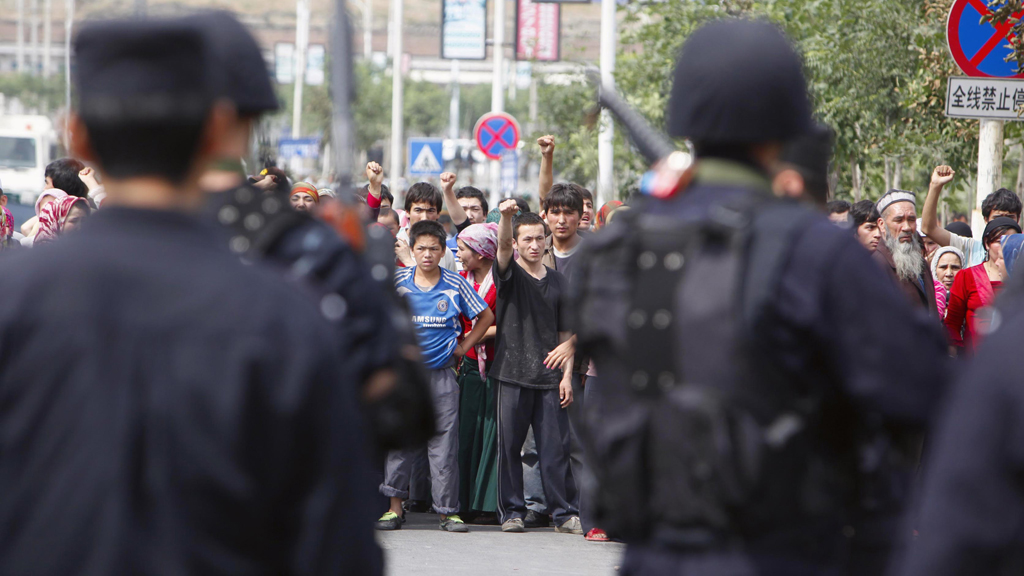Violence and repression: the roots of China’s Uighur unrest
As China’s security apparatus shifts into overdrive in the aftermath of deadly explosions in Xinjiang, an exiled ethnic Uighur leader says a “heavy-handed” Chinese response will make things worse.

Above: Uighur unrest in Urumqi in 2009. Uighur rioting turned violent, and Chinese police were criticised for the subsequent ‘disproportionate’ suppression.
Chinese government persecution of the Uighur Muslim minority in the Xinjiang Uighur Autonomous Region (XAUR) in the west of China is now so severe that exiled Uighur nationalists and international human rights groups predict further escalation of the extreme violence witnessed in recent weeks, write Jonathan Miller and Danny Vincent.
“The Beijing government needs to take responsibility,” says Dolkum Isa, executive chairman of the World Uighur Congress (WUC).
Acts of terror against the state cannot be justified in moral terms but neither can repressive and violent acts by agents of the state. Michael Dillion
“We have no rights. Our political, cultural, economic and religious rights are denied. Even peaceful protests are banned. Our daily lives are threatened,” he says.
“They show zero tolerance. That is why the violence is happening.”
Chinese Foreign Ministry spokesman Hong Lei responded to Thursday’s attack by saying: “The Chinese government has the confidence and the ability to combat the terrorists. These terrorists are swollen with arrogance. Their schemes will not succeed.”
‘Repressive and violent’
The restive region of XUAR appears caught in a spiral of intensifying violence, with the threat of further terror used by the Chinese authorities to justify increased repression, which in turn is leading to greater resentment and hostility.
Domestic terrorism now poses a clear and present danger to the Chinese public.
“Acts of terror against the state cannot be justified in moral terms but neither can repressive and violent acts by agents of the state,” says Michael Dillion, of Lancaster University, and author of several books on China’s Muslims.
“It is only by examining the root causes of a conflict like the one in Xinjiang that there is any hope of resolving, or at least ameliorating, the problem. The Chinese government does not seem willing to do this,” he says.
Splittism
Reports from XUAR suggest that the Han Chinese authorities now treat the region’s 9.5 million Uighurs – an ethnic Turkic group – with such suspicion and hostility that any expression of Uighur identity is deemed an expression of separatist intention… or “splittism” in the government’s Orwellian lexicon.
There’s no doubt that this denial of rights has led to deepening and profound alienation. Sophie Richardson, Human Rights Watch
Analysis of data recently released by China’s Supreme People’s Procuratorate indicate that while indictments for “endangering state security” (ESS) declined in 2013, most ESS trials – for crimes such as subversion and “splittism” – took place in either in the XUAR or Tibet.
State repression in both regions has broad similarities, but the response from militant Uighur nationalists has been much more violent than that of the Tibetan resistance.
Human Rights activists cite many incidents of overt persecution of Uighur Muslims – including one case, just two days ago, in which Uighur protestors reportedly demanding the right to wear Islamic headscarves, were dispersed by security forces using live rounds.
There were reports that four may have been killed and others injured.
‘Profound alienation’
Xinjiang is a remote part of China, to which foreign journalists have limited access – particularly to anything deemed politically sensitive.
Allegations are hard to verify, but foreign observers find Chinese government versions of “facts” hard to accept. It actively obstructs efforts to independently confirm widespread accusations of serious human rights abouse and repression.
The arrest and detention of the prominent Uighur economist Professor Ilham Tohti three months ago led to an international outcry. He was accused by the Urumqi Public Security Bureau of engaging in separatist activities and “fanning ethnic hatred”.
This is about the Uighur asserting their rights. The government needs to change its strategy over how it deals with this problem. Dolkum Isa, chairman of the World Uighur Congress
“There’s no doubt that this denial of rights has led to deepening and profound alienation,” says Sophie Richardson, a Uighur specialist at US-based Human Rights Watch. “Many Uighur feel Xinjiang has been colonised.”
Xinjiang accounts for an area roughly half the size of India. It makes up nearly a fifth of China’s land area but is home to not even one-fiftieth of its population.
Of XUAR’s 22-million inhabitants, less than half are Uighur. Most of them are confined to the southern Tarim basin.
‘Asserting their rights’
There has been huge Han Chinese migration into northern areas, including the regional capital, Urumqi. The Beijing government has sought to develop XUAR’s oil, gas and coal extraction industries to feed the energy hungry factories and power stations in the east.
Uighur unrest and growing militancy is thought to be mostly secular and political rather than Islamist-inspired. Two groups blamed by the government for terrorist attacks are the East Turkistan Islamic Movement and the Turkistan Islamic Party.
Some question whether the groups really even exist, although the terrorism is real enough. Dolkum Isa, chairman of the World Uighur Congress, is dismissive of their alleged links to international jihadism.
“I do not believe this is part of the global jihadist movment,” he told Channel 4 News. “China is always trying to find this link. But it is not radical Islam at the heart of this.
“This is about the Uighur asserting their rights. The government needs to change its strategy over how it deals with this problem.”
-
Latest news
-
Locations for 16 new special needs schools in England announced8m

-
Inside the King’s College encampment at Cambridge University4m

-
Putin says Russia will not be threatened in Victory Day speech3m

-
Stormy Daniels clashes with Trump lawyer in first criminal trial of a US president3m

-
UK interest rates held but cut could be on the way6m

-




